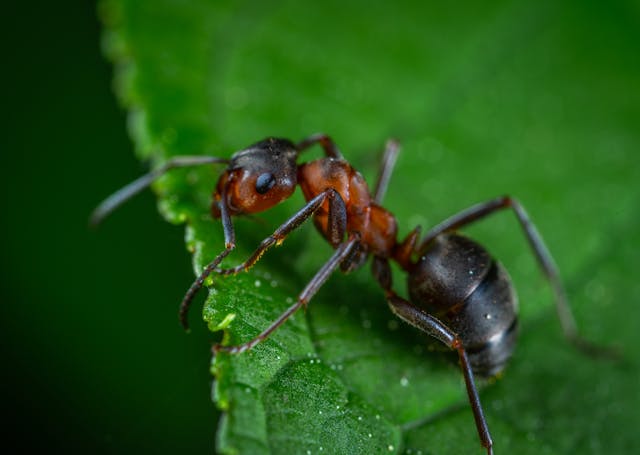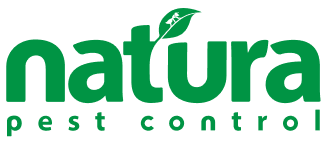When it comes to household pests, ants might seem more of an inconvenience than a real threat. These tiny invaders often march into our homes, drawn by food crumbs and water spills.
But there’s more to these little critters than meets the eye! They come with their fair share of risks. But do ants carry any diseases? Let’s learn more about these tiny terrors and their health risks so you can take proactive steps to keep your home safe!
Types of Indoor Ants
Understanding which species you’re dealing with can help you effectively manage and prevent infestations. Here are some of the most common ant species that invade homes:
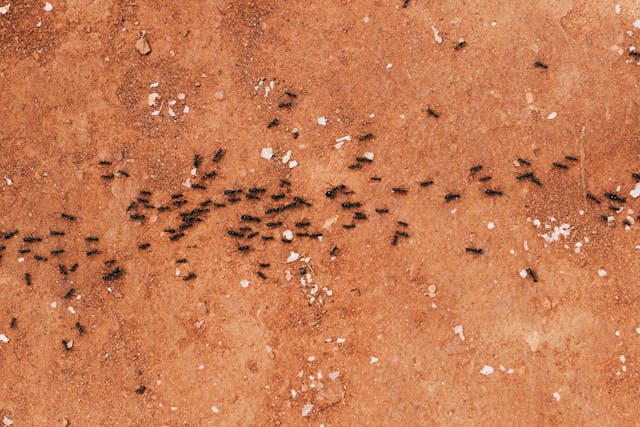
Carpenter Ants
Carpenter ants are among the largest ants you’ll find in your home. They are typically black or dark brown, ranging from 1/4 to 1/2 inch in length.
Unlike termites, carpenter ants don’t eat wood but excavate it to create their nests, which can cause significant structural damage over time. They prefer moist, decayed wood in crawl spaces, basements, and wall voids.
Odorous House Ants
These ants are tiny, about 1/8 inch long, and brown or black. They emit a strong, rotten coconut smell when crushed, hence the name. Odorous house ants are attracted to sugary foods and prefer to inhabit kitchens and pantries. They can quickly form large colonies in wall voids, under floors, and within insulation.
Pavement Ants
Pavement ants are tiny, around 1/8 inch long, dark brown to black, and have distinctive parallel lines on their head and thorax.
These ants typically nest under sidewalks, driveways, and building foundations. Indoors, they forage for food in kitchens and bathrooms, gravitating toward greasy foods and sugary substances.
Pharaoh Ants
Pharaoh ants are tiny, about 1/16 inch long, and light yellow to red with darker abdomens.
These ants prefer warm, humid environments, and their favorite haunts are kitchens, bathrooms, and heating sources. They can form extensive colonies with multiple queens, making them difficult to control once an infestation is established.
Do Ants Carry Any Diseases?
Like many other pests, ants can carry and transmit diseases. While they’re not as notorious as mosquitoes or ticks, they can still pose significant health risks, particularly through contamination.
Unlike mosquitoes, which transmit diseases directly through their bites or ticks that attach to hosts and transmit pathogens over time, ants spread diseases indirectly. These pests pick up bacteria from dirty surfaces, trash, and even animal carcasses and then transfer these pathogens to food and surfaces in your home.
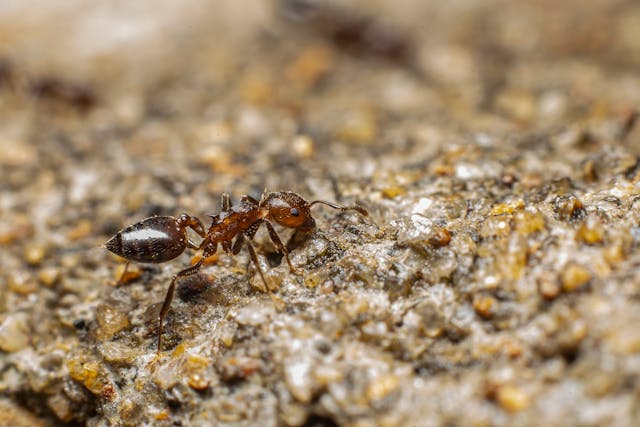
While the risk may be lower than that of mosquitoes or ticks, the sheer number of ants in a colony and their persistent foraging behavior can lead to contamination over time.
Ants are especially problematic in environments where food is handled, such as kitchens, restaurants, and food storage areas. They can also be a concern in healthcare settings, where they can spread pathogens in hospitals and nursing homes.
Specefic Health Risks Posed By Ants
Ants can contaminate your food supplies as they scavenge, spreading harmful bacteria like Salmonella and E. coli. These can lead to foodborne illnesses with symptoms like nausea, vomiting, diarrhea, and abdominal pain, which can be severe for young children, the elderly, and those with weakened immune systems.
Besides the bacterial concerns, ants can cause allergic reactions with their bites or stings. Common symptoms include skin rashes, itching, and, in more severe cases, respiratory issues like wheezing or difficulty breathing. Fire ants, in particular, can deliver painful stings that cause localized allergic reactions and, in rare instances, anaphylaxis.
Hospitals are particularly vulnerable to ant infestations, with severe consequences. They can transfer harmful pathogens to vulnerable populations when they move through sterile environments or crawl over medical equipment.
Preventing Ant-Related Health Risks
Reducing ant-related health risks starts with effective ant control strategies inside and outside your home. Here are some practical tips to keep ants at bay and minimize their health hazards:
- Proper Food Storage: Store food in tightly sealed containers and clean up spills, especially in spots where food is prepared or consumed.
- Sealing Entry Points: Seal cracks or gaps around doors and windows to prevent ants from entering your living space.
- Regular Cleaning Routines: Vacuum your floors, wipe down dirty surfaces, and throw away garbage before it overflows.
When your DIY methods don’t quite do the trick, it’s time to call in the professionals. Our pest control experts will thoroughly inspect your home to locate ant nests and possible places where they can enter your home.
Once we’ve completed our inspection, we’ll devise targeted treatments tailored to the specific ant species and the severity of the infestation. With methods ranging from baits to insecticides and exclusion techniques, we’ll rid your home of ants and prevent them from returning.
With our expertise and personalized approach, you can count on us to tackle your ant problem effectively. Contact Natura Pest Control for targeted pest solutions in the Vancouver-Portland Metropolitan Area!
